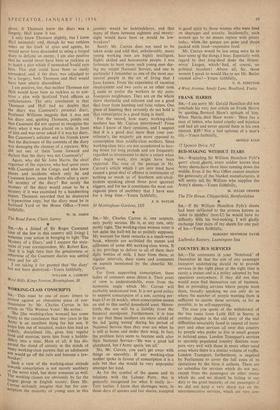SIR,—Mr. Charles Curran is, one suspects, only partly serious. He
is, at any rate, only partly right. The working-class woman voter is not quite the half-wit he so politely supposes. My warrant for these remarks is a much-worn book, wherein are scribbled the names and addresses of some 400 working-class wives. It is my privilege to deliver to all of them their daily bottles of milk. 1 hear from them, at regular intervals, their views and comments on aspects mentioned by the cheerful Mr. Curran.
Far from supporting conscription, these ladies of common sense detest it. Their point of view is understandable, even from the economic angle which Mr. Curran will probably Understand best. It is not good policy to support conscription of a son, earning per- haps £5 or £6 weekly, when conscription means an end to this useful household asset. Hence- forth, the son will be a liability from the financial standpoint. Furthermore, it is true to say that these mothers are more afraid of the lad 'going wrong' during his period of National Service than they ever are when he is still at home and under their wing. In fact, the problem boys seem to become such after their National Service—'He was a good lad aforehand, but t'Army spoils 'em all.'
No, Mr. Curran, you can't get away with things so smoothly. If any working-class mother spoke in favour of conscription it is a safe bet that she would be very unpopular amongst her kind.
As for the symbol of the queue and its relations with the Labour Party, this is generally recognised for what it really is— Tory tactics. I know that shortages were, in those days of queues and fair shares, accepted
in good spirit by those women who were bred on shortages and scarcity. Incidentally, such women are by no means replete with plenty today, when the queues are gone and shops packed with food—expensive food.
Mr. Curran would be less smug were he to hear some oj the things I hear. Especially with regard to that long-dead dodo the House- wives' League, which" had, of course, no political loyalties! Above all, Sir, those women I speak to would like to see Mr. Butler roasted alive I—Yours faithfully,


































 Previous page
Previous page